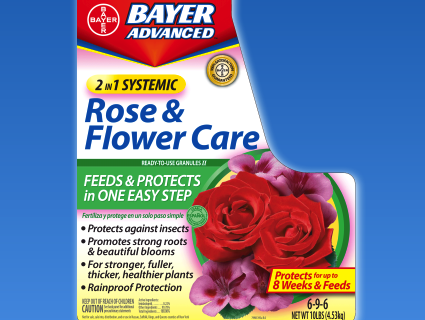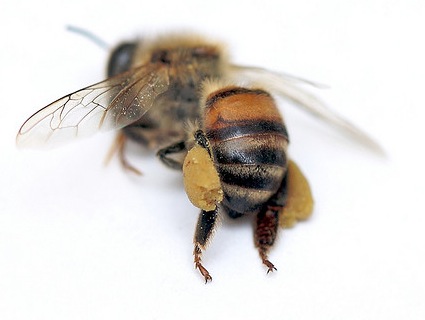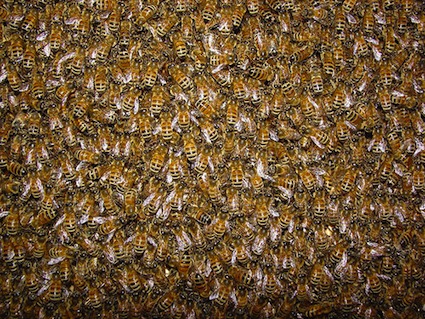
"Protects for up to 8 weeks..." That's bad news for bees.
For a while now, I’ve been writing about the threat to honeybee populations from Bayer’s neonicotinoid pesticides, which are synthetic derivatives of nicotine that attack insects’ nervous systems. Here’s last week’s post on new USDA-funded research that indicts Bayer’s product.
Up to this point, I’ve been focusing on neonicotinoids used for big industrial crops like corn. Virtually the entire US corn crop—which covers more than 90 million acres, far more than any other crop—is grown with seed treated with Bayer’s chemical. Neonicotinoids are what’s known as “systemic,” meaning they suffuse and “express” themselves in the whole plant when it germinates, including nectar and pollen. That’s precisely what makes them so effective at attacking pests—and, unfortunately, “nontarget” species like honeybees and other beneficial insects too.
A reader recently alerted me to the fact that Bayer isn’t just marketing its product to industrial-scale farmers. It’s also marketing neonics to consumers and landscapers—meaning that they’re much more ubiquitous than even I thought.
Walk into the garden section of any Home Depot or Lowe’s, and you’re likely to find a product called Bayer 2-1 Systemic Rose and Flower Care, which offers broad-spectrum pest control (i.e., it kills a wide range of insects) and synthetic fertilizer in one convenient product. Take a close look at the label (PDF; see page 2), and you’ll find that its one active pesticide ingredient is imidacloprid, a neonicotinoid. “Apply granules to soil around base of plant, sprinkling evenlyin the area under branches,” the instructions state. How does the product work? Bayer provides a helpful explanation right on the label:
This product is absorbed by roots and moves through the entire plant. Even new growth is fed and protected against insects for up to 8 weeks. Rain or watering cannot wash off this internal protection!
That’s great news for your flower garden—and bad news for honeybees and other benign insects that your flowers might be beckoning with pollen and nectar. In a Q&A on its website, Bayer advises users that “for best results, consistently apply Bayer Advanced 2-In-1 Systemic Rose & Flower Care every 6 weeks during the growing season.” (Emphasis added.) Yet more bad news for good insects. (The product is also offered in handy spikes for potted plants.)
The company laces several other consumer products with imidacloprid, too, including its 3-in-1 Shrub Plant Starter, its Complete Insect Killer for Soil and Turf, and its Fruit, Citrus, and Vegetable Insect Control. Bayer can turn your entire lawn and garden into a toxic zone for bees!
Even home gardeners who don’t use these products may be subjecting bees and other desirable insects to Bayer’s poison. That’s because commercial greenhouses and nurseries commonly treat potting soil with it, particularly on ornamental plants, and the plants continue “expressing” imidacloprid for weeks after leaving the store.
While the sheer scale of corn production probably makes it the most common way bees are exposed to imidacloprid and other neonics, garden, landscape, and nursery uses can’t be discounted as a factor in declining bee health. In fact, according to Vera Krischik, an entomologist at the University of Minnesota, imidacloprid expresses itself in soil-treated plants like garden flowers at a much higher dose than it does for seed-treated plants like corn. In her research, she found that imidacloprid in nectar from seed-treated plants tend to hover at less than 1 part per billion, while soil-treated plants produced nectar that contains as much as 40 parts per billion.
And the casualties aren’t just honeybees. Krischik’s research shows that beneficial insects (i.e., insects that eat plant-eating insects) like lady bugs and green lacewings are damaged by exposure to imidacloprid-treated plants.
I have an interview with Krischik scheduled for Tuesday afternoon and will report back. I want to learn more about the non-Big Ag uses of Bayer’s chemicals and what impact they’re having on pollinators and other nonpest insects.


















